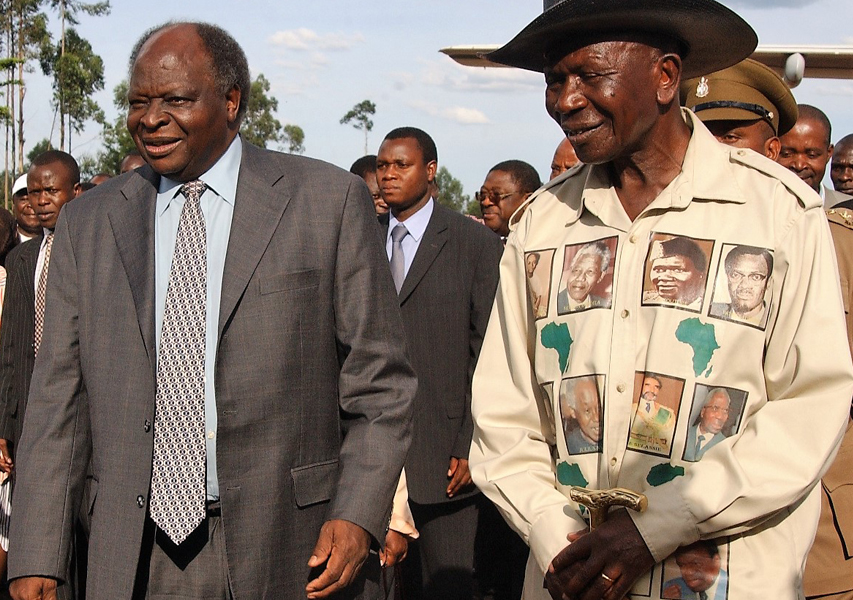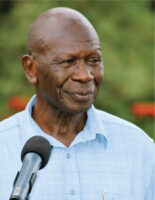
Before his appointment to President Mwai Kibaki’s Cabinet, Moody Awori was unflatteringly referred to as the permanent Assistant Minister in political circles. This was well founded in fact because in previous administrations, he had served in that position in various dockets, among them the Office of the President, Foreign Affairs and Tourism and Wildlife.
His inability to clinch a Cabinet position was puzzling because in the opinion of fair and knowledgeable people, he had the competence, experience and disposition to run a government ministry to any president’s satisfaction. All that ended in 2003. President Kibaki named him to the Home Affairs portfolio and Awori hit the ground running. This patriarch of a wealthy and well educated family, the son of a pioneer Christian missionary and one of the likeable public figures in the country soon acquired an adorable nickname: Uncle Moody. Nobody seems to know who first called him that as a public figure but the nickname gained wide usage, even to this day when he has retired from elective public office.
But Awori will be remembered for much more than being an affable uncle to people who are not even his blood relatives. He may also have ridden the tiger of Kenya’s politics, as he calls it in his memoirs, so successfully that he
reached the station of Vice President of the Republic. Still, any objective evaluation of his long career will find that his main legacy is that of being the public face of government policy that changed a national attitude and culture — a very difficult thing to do as any sociologist can attest. The National Rainbow Coalition (NARC) Administration made Kenya’s prisoners human beings in the minds of their compatriots and Awori was the enthusiastic champion of that policy implementation. “Many of us will never see the attainment of Vision 2030. Nevertheless, we must do everything we can to ensure future generations see its fulfilment through our honest endeavours.”

Before NARC, attitudes towards prisoners hadn’t changed since colonial times. The refrain that prison ‘is not a five star hotel’ and that even petty offenders should be ‘locked up and the keys thrown away’ had resulted in widespread abuse of human rights since it was deemed that prisoners forfeited such rights upon conviction. Moreover, the absence of any reintegration strategies practically ensured that their sentences followed them into the free world upon their release. Whereas many accolades have with justification been heaped on the Kibaki government for revitalising the economy and making the country almost self- sufficient in budget support, prison reform was a policy with singular social impact, especially amongst the nation’s ordinary wananchi (citizens).
On a personal level, Awori’s intellectual grounding, devotion to the public good, his cultured mien and devout Catholicism were always going to find a safe home in the Cabinet of a President who could accurately be described as
possessing those same qualities. And it didn’t do any harm that they were both old boys of the same school, Mang’u, and alumni of the same university, Makerere. In his remarkably candid autobiography, Riding on a Tiger, he writes about his shared political fate with the President in the previous administration where the pre-eminence of sycophantic party hacks consigned thoughtful leaders to the periphery. Years of potential growth were lost as politics as an end in itself became the order of the day. So bad had this situation become that the clearest possible public statement that it could no longer be business as usual was the centrepiece of the new President’s speech on his inauguration day.
The public needed that assurance, and it made Kenyans instantly the world’s most optimistic people at that time. It is to his credit that in his book, Awori does not whitewash truths that the people of Kenya needed to know as part of their historical journey. It is not that his lengthy stay as an assistant minister had nothing to do with his intellectual ability. In fact, it had everything to do with it. “I shortly discovered that top KANU officials…did not tolerate the likes of us from the private sector who exhibited some independence in our thinking,” he writes of his rude awakening after winning the Funyula Parliamentary seat in 1983. “Sycophancy was the safe route. Intellectuals like Mwai Kibaki, who ironically was the party’s national Vice President and Dr Robert Ouko, the Kisumu branch boss, were viewed with suspicion.”
Fortunes changed when the Kenya African National Union (KANU) lost power in 2002. The new President was comfortable in his own skin and Awori could take his place in the sun. He had freedom of thought and action and the only limit to his success was himself. Although he was acknowledged to have acquitted himself particularly well in the Home Affairs docket particularly in charge of the Prisons Department, his baptism of fire would come after his
appointment as the country’s 9th Vice President. Michael Kijana Wamalwa, President Kibaki’s first Vice President, took office in a state of poor health. Almost as soon as he was sworn in, he would be away from public view, constantly needing medical attention. This caused public angst. Not only was he a popular politician but the President was particularly fond of him.
In fact, Awori writes that in all the time that he had watched Kibaki closely, he had known him as an emotionally contained man. But in the days after Vice President Wamalwa died, he saw the President shed tears of pain and he
knew that he had lost as close a collaborator and friend as could be.
